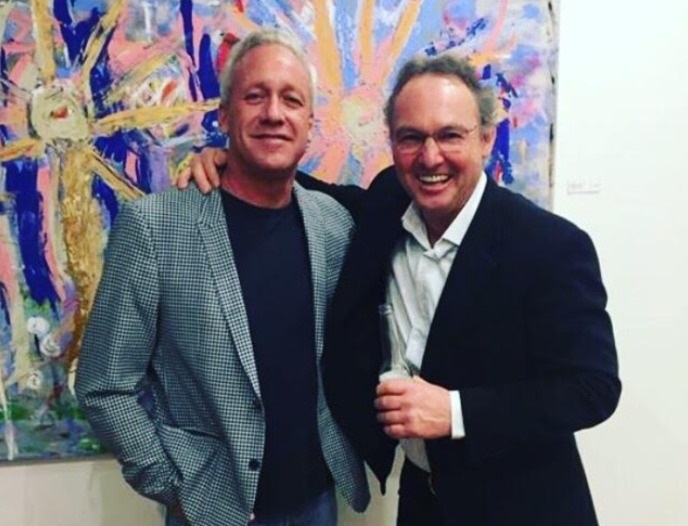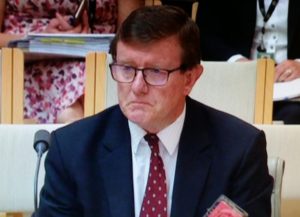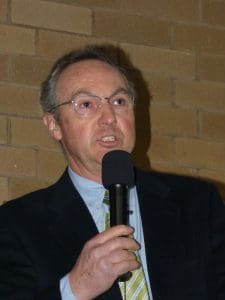
Chick Olsson, left, with AWGA vice-president Martin Oppenheimer.
WOOL growers are calling for an investigation into alleged interference in the director nomination process for the 2019 Australian Wool Innovation election, claiming it is open to manipulation.
The Australian Wool Growers Association is suggesting there has been potential board director interference in the practice of a board candidate applying supporting grower signatures to a nomination form listing multiple candidates.
AWGA is calling for a Senate inquiry after AWGA director and aspiring AWI board nominee Chick Olsson was told he could not apply supporting grower signatures to a multiple candidate ‘ticket’, despite the practice being initially approved by AWI company secretary Jim Story and used in previous AWI elections.
Mr Olsson, a New South Wales wool grower and former AWI director, is currently collecting the required 100 registered levy payer signatures to be eligible for consideration by the AWI Board Nomination Committee to stand in the 2019 director election.
Often aspiring AWI board candidates collect their required signatures under only their own name, but Mr Olsson was given approval by Mr Story in July this year to have several candidates named on a nomination form. Mr Olsson has used the practice in two previous elections, with candidates being elected, including current sitting members Meredith Sheil and David Webster, without AWI interference.
Mr Story texted to Mr Olsson on July 23 this year: “Chick, I am writing to advise that our legal advice is that it is permissible albeit unusual for you to have several candidates named on the nomination form.
“That will mean that the signatories on the form will apply for the 3 candidates as you outlined to me.”
However, after days of discussion, Mr Story confirmed this week via text that Mr Olsson would not be able to collect signatures for multiple candidates on one nomination form.
“Correct. No multiple candidates on one nomination form as we discussed. Jim,” Mr Story texted.
Up to nine people are believed to be collecting signatures for the 2019 election, aiming to be candidates for three director positions falling vacant and currently held by former chairman Wal Merriman, Western Australian director David Webster and New South Wales director Meredith Sheil. Mr Merriman and Mr Webster are believed to be standing for re-election. Ms Sheil has confirmed she will be not seeking re-election.
AWI secretary Jim Story has been honest and forthright

AWI company secretary Jim Story at Senate Estimates hearing last year.
Mr Olsson said he believed Mr Story is an excellent company secretary who had been “honest and forthright” throughout the nomination process.
“It is clear, despite the original advice that he researched for days, that someone of a higher authority has got to or influenced him, and it is not hard to imagine who it might be.
“As a company secretary, it wouldn’t be management, he is effectively a quasi-board member who can only be influenced by the board,” Mr Olsson said.
“He (Mr Story) is a lawyer and the company management has no influence over him at all.”
Mr Story would not tell Mr Olsson who or what influenced him to change his position on the signature collection method, but did not indicate that his legal advice had changed or that the board had made a determination.
“He’s quite vague on it, but when a lawyer gets his facts straight first and says it is a go-ahead and it clearly was a go-ahead because the principles have been set…
“And then at this moment when the board is under severe pressure and the CEO is under severe pressure and there are new potential board nominees standing that are obviously a political threat and out this comes, one has to really wonder.”
Mr Olsson agreed that if AWI’s legal advice was that it is permissible to collect signatures and apply them to multiple candidates, then it followed that there is no legal basis to disallow the practice.
“He’s just said it won’t be allowed.
“I would say that Jim Story has been strongly influenced against his wishes, against his advice,” he said.
“This man has given excellent legal advice after due consideration and then he is forced to give me some very unpleasant news which has made him very uncomfortable – I feel very sorry for Jim Story.”
Senate inquiry is needed – Oppenheimer

AWGA vice-president Martin Oppenheimer
AWGA vice-president Martin Oppenheimer said a Senate inquiry was the logical next step, to investigate the AWI nomination process issue and to resolve the “unfinished business” of the EY Review performance and governance recommendations not implemented by AWI.
“You can’t have a nomination process that is fair if people who are nominating are told rules by the company secretary two months before the closing date and one month before the closing date the rules change.
“At the same time, any sitting directors don’t have to collect any signatures,” he said.
“So it is clearly unfair and biased towards directors seeking re-election to stay on the board and particularly for these directors who have been there for up to 15 years.
“It flies in the face of the EY Review where it was looking to address the issue at AWI where there was limited skills-based selection on the board,” he said.
“It was trying to open it up and make the nomination process easier.”
WoolProducers Australia president Ed Storey also supported investigation of the board nomination process and the AWGA claims.
“Candidates need clear procedures.
“They sought advice early in the process and were given one piece of advice and then it appears that later on that’s changed,” he said.
“That’s very disappointing and potentially can be seen to be restricting shareholders’ democratic rights.
“There needs to be further investigation as to why the initial legal advice is now deemed to be incorrect,” he said.
“It certainly requires looking into – this is a company that levy payers pay a compulsory levy to and these sort of practices, this chopping and changing, is unacceptable.
“It leaves AWI very open to the criticism that incumbent directors are influencing the system.”
Olsson claims ‘political obstruction’ and manipulation risk
Mr Olsson said he had been considering a ‘ticket’ involving himself and two other candidates with strong research backgrounds and some signatures were collected on a multiple candidate nomination form. However, this was abandoned due to lack of industry support and political pressure on the candidates.
“I detected some real negativity about independent people standing who weren’t seen to be part of the wool industry.
“We’ve had teams of people collecting signatures for the past three weeks, but any signatures collected under multiple candidate have to be torn up and we start again.
“It’s a complete and utter waste of everyone’s time, it is political obstruction, and it is a board and company that refuses to bend to the 82 (AWI performance and governance) review recommendations – it is really a maverick board now that is using whatever political tool it can to maintain power.”
Mr Olsson and Mr Falkiner are intending to run in the 2019 election on a ticket with another former director Paul Cocking. Mr Olsson said the multiple candidate nomination form practice was used in 2007 for the Fletcher and Olsson ticket, and again in 2008 for the collection of signatures for Laurence Modiano, in a ticket also including Meredith Sheil, George Falkiner and David Webster. Mr Story was not the AWI company secretary at that time.
“Even in the face of a highly hostile board back then, it was allowed.
“It was impossible for Modiano to collect signatures – he couldn’t do it – we were allowed to put his name on top of the nomination form so wool growers could actually see he was on the form and could put their signature to it,” Mr Olsson said.
“To get the skills we needed we had to collect the signatures by that method.”
He said disallowing application of signatures to multiple candidates on a nomination form would make it difficult for nominees with desired board skills who did not have wide grower networks to collect the signatures and successfully nominate for the AWI board.
“Right now I cannot get signatures for independent people who are highly qualified – that is really the core of it.”
Mr Olsson said he Mr Falkiner and Mr Cocking believe the AWI’s levy-based voting system needed a complete overhaul, including a review of the system requiring compulsory levy-paying wool growers to undergo a further registration process to vote in AWI elections.
“I believe it can be manipulated.
“For example, if every levy payer gets a vote at WoolPoll, why can’t every person get a vote in a board director election and what is the ostensible difference?” he asked.
He also believed that AWI board candidates should be able to collect signatures by fax or electronically.
“It should not be a difficult process – you often have to get 150 signatures to account for the 50 people who believe they are entitled to vote but are unaware they are not registered.
“I think every levy payer should be able to sign a nomination form — I have no problem with collecting 100 signatures,” he said.
“Every levy payer should be entitled to vote in an AWI election.
“There is no such thing as a shareholder in the Australian wool industry – we are not a company because we cannot buy and sell shares (in AWI), so the notion of shareholders is just nonsense,” he said.
“We are tax payers and every taxpayer deserves a right to vote in an election.
“While AWI is able to dick around and protect their patch, this is still going to go on and on and on.
“The Agriculture Minister (Bridget McKenzie) has to act to protect the Commonwealth funds and good corporate governance.”
Mr Olsson said the “recalcitrant” AWI board is pretending to, but clearly not abiding by the 82 recommendations in the 2018 Ernst&Young Review of AWI performance and governance.
Mr Story could not be contacted by Sheep Central prior to this story being published, but he and AWI chair Colette Garnsey have been asked via email to explain why he changed his position on the candidate nomination process. The office of Minister for Agriculture Bridget McKenzie has indicated it could not provide responses before the story was published.
An AWI response received this morning did not answer direct questions about the nomination process issues, but said it is Australian Wool Innovation’s policy not to name the persons who nominate to become directors via the 100 signatures route until they have successfully completed all of the nomination formalities.
“It is standard practice to treat retiring directors consistently with that process.
“AWI expects to be in a position to confirm all of the candidates for election at the end of the nomination period, which runs from Friday September 6, 2019 to Tuesday September 24, 2019,” the AWI statement said.
“At that time, the members of the BNC, who include independent industry representative Simon Cameron, a Tasmanian wool grower, will also be named.”



Nothing to see here, as usual, everyone in the administration side of the wool industry is using their (our) precious time and resources wisely.